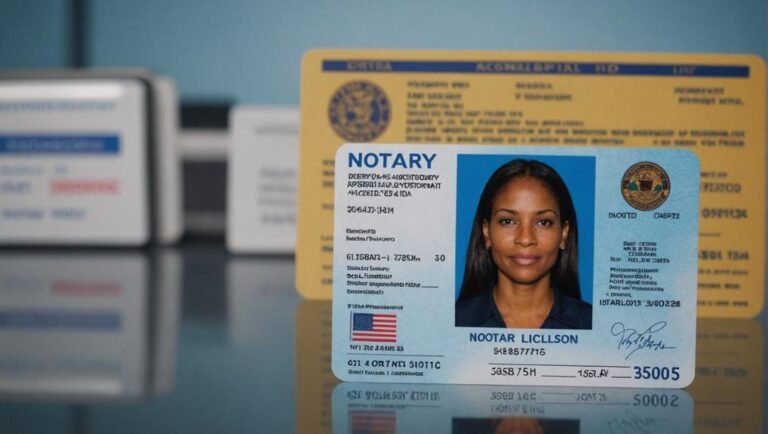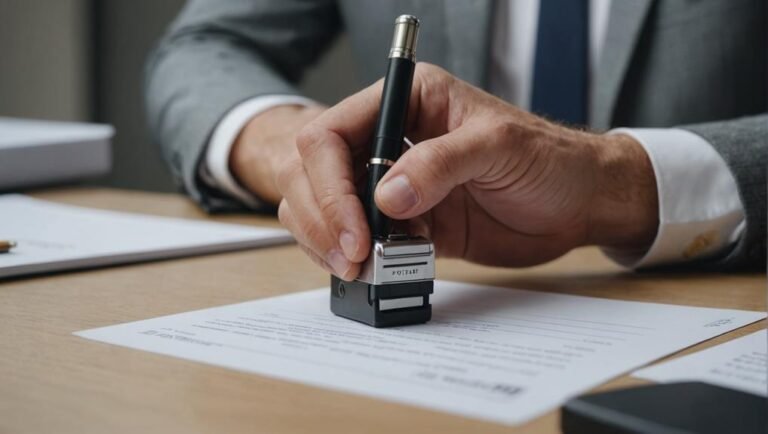In Florida, you can charge up to $10 per stamp for notarial acts. This fee aligns with state-regulated structures to guarantee compliance and professionalism. This fee pertains to each stamp utilized during notarization processes. Use this guideline to maintain accuracy and legality in your notarial practice.
Key Takeaways
- Notaries in Florida can charge up to $10 per stamp for notarial acts.
- Florida regulates notary fees to ensure transparency and fairness.
- Maximum fee for certifying a copy of a document is $10 per copy.
- Following state-regulated fee structure is crucial for professionalism.
- Clear communication of fees is essential to avoid misunderstandings.
Notary Fee Regulations in Florida
When establishing your notary fees in Florida, it's important to adhere to the state's regulations to guarantee compliance and avoid potential commission suspension. Florida Notaries have specific guidelines regarding notarial fees that must be followed.
For general notarial acts, the maximum fee that can be charged per signature is $10. However, it's important to note that additional charges may apply for services such as travel fees or handling electronic documents.
If you're planning to solemnize a marriage ceremony as a notary in Florida, the maximum fee permissible for this service is $30. It's essential to communicate these fees clearly to your clients to promote transparency and avoid any misunderstandings.
Notary Public Earnings and Fees
Maximizing notary public earnings in Florida involves strategically establishing and transparently communicating your service fees within the state's regulated fee structure to guarantee compliance and professionalism.
When considering your notary fees in Florida, it's crucial to grasp the various charges you can apply to your services. Here are some key points to keep in mind:
- Notaries in Florida can charge up to $10 per stamp for notarial acts.
- Performing a wedding ceremony in Florida can earn a notary a fee of $30.
- Additional fees, such as travel fees, time charges, or e-doc fees, can be added to the notary service cost.
- The maximum fee for certifying a copy of a document in Florida is $10 per copy.
Remember that all notaries in Florida must adhere to the state-regulated fee structure for their services to ensure professionalism and compliance. Setting your fees thoughtfully and being transparent about them will help you attract clients and build a successful notary business in Florida.
Travel Fee Guidelines for Notaries
Establishing transparent travel fee guidelines is vital for notaries in Florida to guarantee clear communication and avoid confusion between notarial and travel fees. According to Florida Notary Public laws, notaries have the autonomy to set their travel fees, which should be billed separately from notarial service charges.
It's essential for notaries to inform signers of any applicable travel fees before commencing on the journey to provide services. By separating travel fees from notarial fees, notaries adhere to the standards of professionalism and transparency outlined in Florida's notary laws.
When issuing invoices, including travel fees as a distinct line item ensures clarity and prevents misunderstandings regarding the breakdown of costs. Following these travel fee guidelines not only fosters trust between notaries and their clients but also upholds the integrity of the notarial process in Florida.
Wedding Ceremony Charges in Florida
Notaries in Florida charge a fixed fee of $30 for conducting wedding ceremonies. When it comes to solemnizing marriages, notaries in Florida follow a specific fee structure to maintain consistency in service.
Here are some key points to understand about wedding ceremony charges in Florida:
- Performing wedding ceremonies is a specific notarial act with a set fee of $30.
- The fee for solemnizing a marriage in Florida is set at $30.
- Notaries must stick to the prescribed fee of $30 for conducting wedding ceremonies in Florida.
- Wedding ceremony charges are distinct from general notarial fees in Florida.
- This fixed fee maintains that notaries provide wedding ceremony services at a standard rate across the state, offering clarity and predictability for couples seeking to formalize their union.
Governor's Authority on Notary Fees
To guarantee compliance with fee regulations and avoid commission suspension, notaries in Florida must understand the Governor's authority to oversee and enforce proper fee practices.
In the State of Florida, notaries are subject to specific fee limits set by law. Charging excessive fees or adding unauthorized charges, such as a travel fee, can result in severe consequences, including suspension of their commission by the Governor.
It's essential for notaries to adhere to the prescribed fee guidelines to ensure they operate within legal boundaries and maintain their commission status. The Governor's oversight plays a significant role in making sure that fees charged by notaries are fair and in accordance with state regulations.
Transparency in Notary Fees
Promoting clear communication of notary fees is crucial to maintaining professionalism and trust with clients in Florida. Transparent fee disclosure is key to establishing a positive relationship with those seeking notarial services.
Here are some important points to ponder regarding transparent fee practices in Florida:
- Itemized breakdown: Provide clients with a detailed breakdown of fees, including the cost per stamp.
- State regulations: Familiarize yourself with the laws governing notary fees for different notarial acts in Florida.
- Avoid misunderstandings: Clear communication helps prevent confusion and ensures clients comprehend the fees involved.
- Professionalism: Transparent fee practices enhance your reputation as a trustworthy and reliable notary.
- Building trust: Openly discussing fees fosters trust and credibility with clients seeking notarial services.
Notary Fees By Notarial Act
How are notary fees determined for different types of notarial acts in Florida?
In Florida, notaries follow a structured fee system based on the type of notarial act performed. For general notarial acts, such as witnessing signatures, notaries can charge $10 per signature. However, for more specialized services like acknowledgments and jurats, the fee increases to $25 per signature. Oaths, another common notarial act, also come with a fee of $25 per act in the state of Florida.
It's crucial to note that notarial fees can vary across states. For instance, New Jersey has set fees at $2.50, $15, and $25 for different types of notarial acts. Each state has its regulations regarding notary fees to ensure equitable compensation for notaries while safeguarding the public from excessive charges.
When seeking notarial services in Florida, understanding the fee structure for different notarial acts can help both notaries and the public navigate the process smoothly.
Notary Fee Disclosure Requirements
States across the United States have varying requirements for notaries to disclose their fees to the public. When it comes to notary fee disclosure requirements, each state has its own set of rules to promote transparency and fairness in notarial services.
Here are some key points to keep in mind:
- Michigan, North Carolina, and Pennsylvania mandate notaries to post or inform clients about their fees upfront.
- Georgia, Missouri, and Montana require notaries to display fee schedules prominently for easy access.
- Connecticut, Idaho, and Virginia have specific travel fees set for notaries, promoting clarity for clients.
- Arizona, Indiana, and Utah use mileage-based rates for notary travel fees, depending on the distance traveled.
- Alabama, Colorado, and Texas permit notaries to establish their own travel fees, giving them flexibility in charging for services like performing a marriage.
Understanding these state-specific notary fee disclosure requirements is essential for both notaries and clients seeking notarial services.
Notary Travel Fees Across States
Various states in the United States have different approaches to setting notary travel charges, providing notaries with flexibility in determining how they charge for their travel services.
States like Connecticut, Idaho, and Virginia have specific travel charges for notaries, while Arizona and Utah use mileage-based rates.
Arkansas, Georgia, and Michigan offer guidelines on charging for travel, and Alabama, Texas, and New York allow notaries to set their own charges.
Notaries in Alaska, Delaware, and Illinois also have the freedom to determine their travel charges.
These fees are essential for notarial services that extend beyond the traditional office setting, such as notarizing documents at a client's location, performing public notarial acts, or overseeing marriage ceremonies.
Understanding the varied approaches to notary travel charges across states is important for notaries to appropriately price their services and ensure compliance with state regulations while providing convenient notarial services to the public.
Starting Your Notary Career Today
Starting on your notary career today can be a rewarding and lucrative journey in the State of Florida. As you venture on this path, keep in mind that notaries may charge up to $10.00 per signature for various notarial acts. Here are some key points to ponder as you become a notary in Florida:
- Educational Requirements: To become a notary in Florida, you must complete an educational course and pass a state exam.
- Fee Structure: Notaries can charge up to $10.00 per signature, with additional fees for specific services like off-site notarizations.
- Specialized Services: Real estate transactions often require notarizations, offering opportunities for higher fees per signature.
- Travel Fees: Off-site notarizations may incur travel fees starting at $55.00, with additional charges for waiting time.
- Ethical Considerations: Remember to adhere to Florida's regulations, avoiding legal advice and notarizing incomplete documents.
Frequently Asked Questions
How Much Can I Charge to Notarize a Document in Florida?
You can charge up to $10 per signature for notarizing a document in Florida, as per state laws. Additional fees for services like marriage ceremonies or travel may apply. Adhering to fee regulations is essential to avoid commission suspension.
What Is the Most I Can Charge for a Notary?
You can charge a maximum fee of $10 per notary stamp in Florida. Notary fees are set within this price range by law. Remember to abide by the fee limits to provide accurate and lawful services.
How Much Do Notaries Make per Signing in Florida?
In Florida, notaries typically make between $10-$30 per signing, depending on the service provided. Competition can influence rates, but negotiating with clients and offering competitive pricing can maximize income potential and profitability.
Does Florida Require a Notary Seal and Stamp?
Yes, Florida requires a notary seal and stamp for notarizations. Notary responsibilities include proper use of these essential supplies to verify document authenticity and comply with state regulations. Remember, notary fees for stamping are capped at $10 per stamp.
Conclusion
To wrap up, don't count your chickens before they hatch when it comes to notary fees in Florida. Make sure to familiarize yourself with the regulations and guidelines in order to set your fees appropriately.
Remember, staying informed and following the rules will help you build a successful notary career in the Sunshine State.
So, go out there and stamp your way to success!






